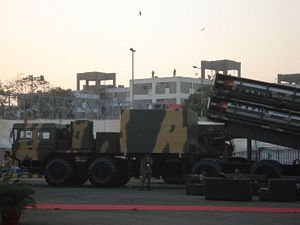As my colleague Prashanth Parameswaran already reported last week (See: “Time for Pakistan to Change its Nuclear Strategy: Experts”), a new paper by two American think tanks titled “A Normal Nuclear Pakistan” argues that Pakistan could have the third-biggest nuclear stockpile within a decade and could end up producing 20 nuclear warheads annually.
Furthermore, the report, co-written by two scholars of the Carnegie Endowment for International Peace and the Stimson Center, notes that Islamabad is successfully competing with – and likely outperforming – New Delhi in the build-up of its nuclear arsenal.
“Pakistan operates four plutonium production reactors; India operates one. Pakistan has the capability to produce perhaps 20 nuclear warheads annually; India appears to be producing about five warheads annually,” the report states.
Pakistan is estimated to possess around 120 nuclear weapons against India’s 100. However, “[w]hether New Delhi chooses to compete more intensely or not, it is a losing proposition for Pakistan to sustain, let alone expand, its current infrastructure to produce greater numbers of nuclear weapons and their means of delivery,” the study finds.
The authors use the U.S.-Soviet nuclear arms race, which was partially responsible for bankrupting the Soviet Union, as a historical analogy. “Just as the Soviet Union’s large nuclear arsenal was of no help whatsoever for its manifold economic and societal weaknesses, Pakistan’s nuclear weapons do not address its internal challenges,” the study emphasizes.
The study also finds that while India enjoys an advantage in the production of fissile material due to its large power and prototype fast-breeder reactors, Pakistan dedicates more fissile material to the production of nuclear weapons:
In terms of total stockpiles of plutonium and HEU [highly enriched uranium] for nuclear weapons, India has about 600 kilograms of plutonium, while Pakistan has about 170 kilograms of plutonium and 3.1 metric tons of HEU. Assuming that each nuclear weapon would require five kilograms of plutonium or 15 kilograms of HEU, with existing stockpiles of fissile material India could theoretically construct up to 120 weapons, while Pakistan could construct up to 240.
Overall, however, India has a larger stockpile of plutonium than Pakistan, which will be an advantage for New Delhi in the long-run:
Plutonium is in most respects more desirable than HEU as a material for nuclear weapons, given that less of it is required for an equivalently powerful fission bomb, which makes plutonium warheads lighter and more suitable for delivery by ballistic missile.
Due to the larger amount of fissile material dedicated to the production of nuclear weapons, Islamabad could “have a nuclear arsenal not only twice the size of India’s but also larger than those of the United Kingdom, China, and France, giving it the third-largest arsenal behind the United States and Russia,” the authors argue. “Many observers have concluded that Pakistan’s rate of fissile material production (and assumed construction of nuclear weapons) gives it the fastest-growing nuclear weapons stockpile.”
Within ten years Pakistan could field 350 nuclear weapons, the report notes. According to Mansoor Ahmed, a nuclear expert at Quaid-i-Azam University in Islamabad, quoted in the Washington Post, that figure is inflated. He argues that the more likely number is between 40 to 50.
“This report is overblown. However… what the world must understand is that nuclear weapons are part of Pakistan’s belief system. It’s a culture that has been built up over the years because [nuclear weapons] have provided a credible deterrence against external aggression,” he says.

































